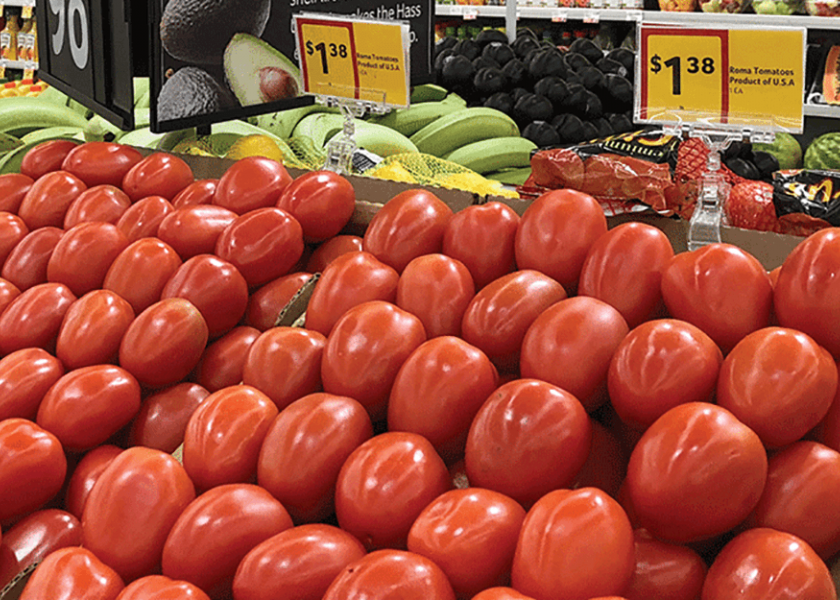Increasing tomato imports from Mexico could cost U.S. growers $250 million annually, University of Florida study shows

Darker days may be ahead for U.S. tomato growers, new research from the University of Florida shows.
If imports of tomatoes from Mexico increase by 50% in coming years, based on historical trends, new University of Florida research shows American growers could lose $253 million annually, or 27% of their current revenue.
The Fresh Produce Association of the Americas said in a statement that the Florida study makes assertions that are taken out of context, resulting in “conclusions that are misleading and unrealistic.”
Study finds
The study said that expected imports would be a big loss for American tomato growers who have already seen their share of sales decline in the past two decades, according to a news release from the University of Florida.
U.S. farmers produced 1.3 billion pounds of fresh tomatoes in 2020, according to the release, less than one-third of the harvest from 2000.
That decline is due to competition from Mexico and other challenges, Zhengfei Guan, an associate professor of food and resource economics at the University of Florida’s Institute of Food and Agricultural Sciences, said in the release.
Guan has published a study, accepted for publication but not yet available online, on the consequences of intensifying Mexican competition for American growers. The market positions of Mexican and domestic tomato industries completely reversed over the past 20 years, according to U.S. trade statistics.
Mexico now dominates the U.S. market, with three times more market share than the domestic industry.
That change sparked Guan’s interest in pursuing the new study, according to the release.
“The two countries had a series of trade disputes over fruit and vegetables recently,” he said in the release.
“One reason is that surging imports from Mexico boosted by subsidies have depressed prices, and American growers are quickly losing market shares. The findings from our study will provide tomato producers and policymakers with important insights on the challenges and the sustainability of the U.S. tomato industry.”
The release said Guan measured the potential losses the U.S. industry will sustain as a result of the increasing imports from Mexico, given the steep growth over the years. As a frame of reference, the volume of imported tomatoes from Mexico increased by about 60% from 2009-19.
Results of Guan’s research, according to the release, show that prices of domestic tomatoes are particularly sensitive to imports from Mexico in an increasingly saturated market.
The imports are especially damaging to the Florida tomato industry, which has about $400 million in sales and has the same harvest seasons as Mexico, the release said. West-central, southwest and southeast Florida are the biggest tomato-producing areas in Florida.
The trade deficit complicates matters for farmers in several commodities — not just tomatoes. Specifically, fruit and vegetables — such as tomatoes, strawberries, peppers, cucumbers and melons — accounted for 50% of the total U.S. agricultural imports from Mexico in 2020, according to the U.S. Department of Agriculture.
“But all may not be lost, if the U.S. fruit and vegetable industry could revolutionize the production technology,” Guan said in the release. “Mechanization or automation will be a game-changer and is the future for this labor-intensive industry.”
FPAA reaction
The FPPA said the paper’s topline finding suggests a 50% increase in Mexican tomato imports “in the coming years,” while a chart in Dr. Zhengfei Guan’s study shows that Mexican tomato imports climbed about 20% in the decade from 2009 to 2019.
“Mexico has become the main source for vine-ripened round and Roma tomatoes during the late fall, winter, and early spring seasons and the market share is reflective of that,” Lance Jungmeyer, president of the FPAA, said in the release. “Consumers prefer flavorful vine-ripened tomatoes over gassed green tomatoes,” said “While we expect consumers to continue to choose Mexican vine-ripened tomatoes, we are beyond flattered that Dr. Zhengfei Guan suggests 50% growth. However, that simply is unrealistic especially considering that volumes have grown only 20% during the past decade.”
The paper by Guan, the FPAA noted, also discusses increasing costs of harvesting in Florida and elsewhere, a factor that FPAA agrees is caused by some U.S. states more than doubling the minimum wage in recent years. Rising wage rates also hit all businesses, including U.S. distributors of Mexican produce.
“For over a hundred years, American jobs have been built by U.S. distributors of Mexican tomatoes,” Jungmeyer said in the statement. “A 2019 University of Arizona study showed that more than 33,000 U.S. jobs were created by imports of Mexican vine-ripened tomatoes, which for obvious reasons are generally preferred over field-grown gassed-green tomatoes such as we see from Florida.”
FPAA said it does further growth for imported Mexican tomatoes, which by and large are grown in protected and greenhouse environments.
“Large buyers are voting based on many factors, including climate change and impact on the environment,” Jungmeyer said in the release. “Mexican tomatoes check all the boxes when it comes to reducing water use, slashing chemical inputs and reducing carbon footprint.”
Jungmeyer said in the statement that it is “inappropriate” to blame Mexican imports for shortages in available U.S. agricultural workers and increased wages, just as Mexican imports are not responsible for hurricanes and tropical storms or real estate development pressures in Florida that also have harmed Florida tomato growers.







